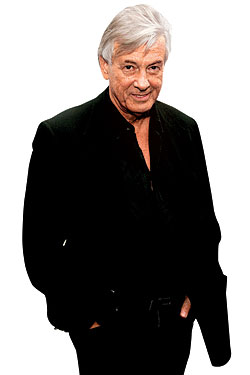
In Basic Instinct, director Paul Verhoeven filmed probably the most famous crotch shot in the history of cinema. Nonetheless, Verhoeven dismisses the most sacred of all sex dreams: the penetration of Mary by the Holy Spirit, which resulted in the miracle of the virgin birth. In his new book, Jesus of Nazareth, a scholarly treatise on the historical Christ, Verhoeven, maker of such fantasy movies as RoboCop, Starship Troopers, Showgirls, and The Fourth Man (which includes a Jesus-on-the-Cross fellatio dream sequence), cuts the Prince of Peace and the more than a billion people who believe the accounts of his time on Earth very little slack, using close readings of the Gospels to fairly convincingly cast doubt upon such marvels as walking on water, the “multiplication of the loaves,” and the Resurrection.
“Jesus was a human being, bound by history and the natural world; an extraordinary man, to be sure, but still a man,” says the now-71-year-old Verhoeven as he sits in the coffee shop of a midtown hotel, his lank silver-gold hair swinging about as he staccato-fires his argument. “Jesus may have had an immense sense of importance or destiny, but he never claimed to be the Son of God.” Verhoeven’s here to plug his book at the Hudson Union Society. Then why care about Jesus if he’s not the Son of God? Verhoeven says, “Because of his ethics. His thought. It isn’t because of the healings, because now humans possess the healing technology to do 100 times, 1,000 times what Jesus did. What we are left with is what he said, the parables, the moral thinking, because when you begin to study Jesus’ life, as the miracles fall away as physical impossibilities, you learn that the quotes, the speeches, and the reasoning behind them, for the most part, are genuine.”
As to how he came to write such a book (the notes, bibliography, and various indexes take up 87 of the 288 pages), Verhoeven, who grew up in The Hague during the Nazi occupation, smiles slyly and says, “You mean when I’m supposed to be spending all my time making another version of Total Recall? There are other things to think about, you know.” The fact that he had a degree in both math and physics didn’t prevent him from becoming the best known of all Dutch filmmakers, so the fact that he spent months shooting Elizabeth Berkley thrusting her crotch didn’t keep him from also being the first nontheologian Fellow in the prestigious “Jesus Seminar,” a group of scholars dedicated to sorting out likely fact from the obfuscations and flat-out fibbing that appear in the Gospels of Mark, Matthew, Luke, John, and Gnostic Thomas.
For Verhoeven, Jesus is as much a political figure as a spiritual one. “The Romans saw him as an insurrectionist, what today is often called a terrorist. It is very likely there were ‘wanted’ posters of him on the gates of Jerusalem. He was dangerous because he was proclaiming the Kingdom of Heaven, but this wasn’t the Kingdom of Heaven as we think of it now, some spectral thing in the future, up in the sky. For Jesus, the Kingdom of Heaven was a very tangible thing. Something that was already present on Earth, in the same way that Che Guevara proclaimed Marxism as the advent of world change. If you were totalitarian rulers, running an occupation like the Romans, this was troubling talk, and that was why Jesus was killed.” As far as Verhoeven is concerned, Jesus is a similar figure to Joan of Arc, a spiritually oriented political being who just might have been a “borderline” psychopath.
In the end, however, Verhoeven is a moviemaker, and he readily admits that his Jesus book, for all the footnotes and often speculative arguments about which Gospel rings truer than the others (in the opinion of the Jesus Seminar, the Gospel According to John is considered to be the least reliable), is essentially “a treatment for a film I have been thinking of making for the past 30 years.” This is problematic, however, “because to make a film you must have action. In America I am known as the director of RoboCop and Starship Troopers; these are what are usually referred to as action films. Yet here I am trying to make a historical film in which some of the best-known action scenes will not be portrayed because they didn’t happen. That gives me a lot of talking. I don’t know if I can make a film with people standing there talking for five minutes at a time. Who wants to watch that? This is a dilemma.”
Verhoeven sighs. One day, he hopes, he will figure out how to make his Jesus film, if for no other reason than to answer the picture of Jesus presented in Mel Gibson’s The Passion of the Christ. “If that’s God,” Verhoeven says, “then we are really fucked.”
Have good intel? Send tips to intel@nymag.com.